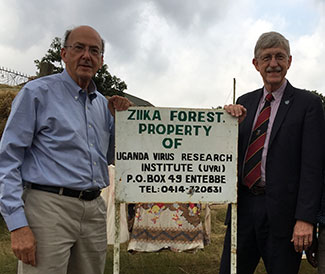Recognizing NIH Director Dr Francis S Collins, a global health hero
November / December 2016 | Volume 15, Number 6
All of us in the global health research community owe a huge debt of gratitude to Francis Collins for his stellar leadership of the NIH over the last eight years. He has been incredibly generous with his support and his time, which allowed us to advance the cause of global health in ways I'm not sure we can yet measure.
Through his energetic and enthusiastic direction, he has stimulated interest in global health science across the 27 Institutes and Center that comprise NIH. He made the cause one of his top priorities and used the NIH Common Fund to establish two critical programs - the Medical Education Partnership Initiative (MEPI) and the Human Heredity and Health in Africa (H3Africa) program.
Working with the Office of the Global AIDS Coordinator at the State Department, Francis helped stand up MEPI, which has been a tremendously successful effort to transform medical education in Africa by strengthening curricula, decentralizing training to produce health care workers in rural areas, implementing technology and establishing a regional network to leverage resources. It's also producing researchers capable of generating evidence to increase efficiency and effectiveness of U.S.-funded programs, such as the President's Emergency Plan for AIDS Relief.
Francis has also reached out to engage with private partners, forging a close relationship with the Bill & Melinda Gates Foundation that includes regular meetings of working groups engaged in nearly a dozen topics. In addition, he collaborated with the Wellcome Trust to advance genomics in Africa, through the H3Africa program. By providing genomics training for African scientists and supporting a biobank on the continent, Francis is laying the foundation to produce groundbreaking discoveries that will benefit us all.

Francis and I visited Uganda's Zika Forest on our many
travels together.
He also helped nurture a number of new organizations that are having an enormous impact on global health and has reached out to other U.S. government agencies - including Homeland Security and the Pentagon - to enhance collaboration on topics of shared interest. He has shown an appreciation for "soft power" and the notion that America can make a difference not only as the world's soldier but also with an outstretched hand, as its doctor.
He has seen first-hand in his travels that Americans don't have a monopoly on good ideas and that we have much to learn from others. It is only by staying abreast of scientific progress globally that we may remain competitive leaders in biomedical research. By improving health in poor countries, we may also nurture political stability and advance economic development.
A talented ambassador for global science, Francis traveled widely during his tenure, meeting with heads of state, ministers of health and education, queens and princes - but always making time to visit with medical students and postdocs. Using music as his calling card, Francis bridged cultural divides by strumming his guitar or tinkling the ivories of a grand piano. He is an expert at building effective relationships, which after all, is what global health is all about.
I'm delighted that, despite the coming change in leadership, Francis plans to continue to oversee his lab at NIH, carrying on important work in diabetes and aging research. Through his wise stewardship and effective outreach to Congress, Francis has strengthened bipartisan support for biomedical research. No doubt, he will persist in making the case that NIH funding brings some of the greatest returns on investment across our government.
As Francis prepares to step down and we look ahead to the new administration, we at NIH remain more committed than ever in our mission to advance scientific discoveries that improve health for all the world's people.
More Information
To view Adobe PDF files,
download current, free accessible plug-ins from Adobe's website.